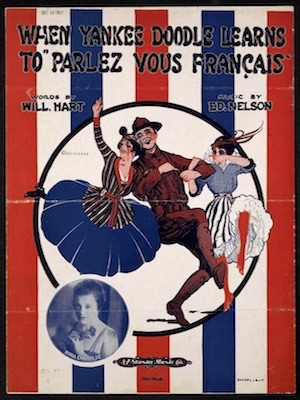
When Yankee Doodle Learns to "Parlez Vous Français"
Live Version
Studio Version
Sheet Music
Student Essay
How Music and Art Fantasize War
“When Yankee Doodle Learns to Parlez Vous Francais” by Ed Nelson highlights the impact of war music on American civilians. Composed in G Major, Ed Nelson’s 2/4 up-tempo march uses the melody of the famous tune “Yankee Doodle”, which allows listeners to already be able to hum along. The lyricism in this song portrays French women as prizes to be easily won by American soldiers. The song speaks of a soldier’s experience with French women and his inability to speak to them do to a language barrier. As the song progresses, the soldier learns enough French to know how to call these women “ma Cherie”, which means something along the lines of “my sweet”. He also learns how to say, “wee wee” to every French woman that yearns to kiss him. The cover pictures two small-waisted women dangling on a rosey-cheeked soldier grinning ear to ear beside a headshot of mezzo-soprano, Anna Chandler. I posit that this sheet music fantasizes the war.
Depictions of war in World War I propaganda posters were certainly exaggerated and at times made up, such as depicting joy-filled soldier’s dancing in uniform, and sheet music covers similarly portrayed women and children as helpless. Not only were soldiers incorrectly portrayed through sheet music art and advertisements, but also their experiences were fantasized through song lyrics. One explanation for this phenomena is that the realities of war on the Western Front would not sell. Sheet music would sell better if it told a story of a soldier wooing a French woman instead of the horrific truth of the soldier’s living conditions. Similar to an advertising jingle, Tin Pan Alley publishers took certain measures to sell the war to the American public. After the sinking of the Lusitania, songs supported the war by demanding gratitude, devotion, and conformity. Americans, in all of their diversity, were in dire need of something to tie them together, and popular song gave them a shared cultural knowledge. Employing “Yankee Doodle” lyrically and through melodic motives to refer to the American soldier in “When Yankee Doodle Learns to Parlez Vous Francais” was a tactical choice because the original tune contained powerful symbolic value with historical and cultural relevance dating back to the American Revolution. This song also evidences the exceptional impact that constructions of masculinity and femininity has on international relationships during war, and on the maintenance of national power. Music such as “When Yankee Doddle Learns to Parlez Vous Francis” had a resounding impact on shaping our national identity in the early 1900s. Thus it is our duty to give voice to the music and literature that has been dusted under the rug and understand the footprint that this music left in the development of American popular song.
Related Resources
Aubitz, Shawn, and Stern, Gail F. “Ethnic Images in World War I Posters.” Journal of American Culture 9 (1986): 83-98.
Crawford, Richard. “After the Ball: The Rise of Tin Pan Alley.” America’s Musical Life, 471-493. New York: W.W. Norton, 2001.
Enloe, Cynthia H. Bananas, Beaches and Bases: Making Feminist Sense of International Politics. Berkeley: University of California Press, 2000.
Gibbons, William. "Yankee Doodle and Nationalism (1780–1920)." American Music: A Quarterly Journal Devoted to All Aspects of American Music and Music In America 26, no. 2 (2008): 246.
Goldmark, Daniel. “Creating Desire on Tin Pan Alley.” The Musical Quarterly 90, (1 July 2007): 197–229.
Helquist, Michael. "Resistance, Dissent, and Punishment In WWI Oregon." Oregon Historical Quarterly 118, no. 2 (2017): 256-259.
Jones, Amelia. "Equivocal Masculinity: New York Dada In the Context of World War I." Art History 25, no. 2 (2002): 162-205.
Jones, Anne Goodwyn. "Gender and the Great War: The Case of Faulkner and Porter." Women's Studies 13, no. 1/2 (1986): 135-148.
Lubin, David M. Grand Illusions: American Art and the First World War. Oxford: Oxford University Press, 2016.
Various Artists. The Great War: An American Musical Fantasy. Archeophone, 2006.
Winter, J.M. Remembering War: The Great War Between Memory and History in the Twentieth Century. New Haven: Yale University Press, 2006.
Written by

Emily Dietz is a fourth-year student pursuing a double major in music and media studies at the University of Virginia. She is the outgoing Music Director of the all-female a cappella group, The Virginia Sil’hooettes. In addition to her commitments on grounds, Emily works as the house manager at The Southern Café and Music Hall and interns at Red Light Management. After graduation, Emily plans on moving to New York City to pursue a career in the entertainment industry.
Song Information
Recording Information
Performers

Crystal Golden, Soprano, is a Master's student in Vocal Performance at George Mason University. She won First-Place at several state and regional competitions, and has performed major operatic roles both at GMU and internationally (Amalfi, Italy). She has received numerous awards in academic achievement, has studied abroad at the University of Oxford, and is a member of both Phi Kappa Phi and Phi Beta Kappa.

Estrella Hong is currently a doctoral student in piano performance at George Mason University in the studio of Dr. Linda Monson. She is also a graduate teaching assistant in keyboard skills. She studied piano at the National Conservatory in Buenos Aires, Argentina, as a young pianist. Additionally, she graduated with a Biochemistry degree at UCLA and assisted various research projects in Whitesides lab at Harvard University.
Live Version

Eli Stine is a composer, programmer, and educator. He is currently pursuing a Ph.D. in Composition and Computer Technologies as a Jefferson Fellow at the University of Virginia. Stine's work explores electroacoustic sound, multimedia technologies (often custom-built software, video projection, and multi-channel speaker systems), and collaboration between disciplines (artistic and otherwise).
Studio Version



Song Transcription
[Verse 1]
When Yankee Doodle came to Paris town,
Upon his face he wore a little frown,
To those he’d meet upon the street he couldn’t speak a word
To find a Miss that he could kiss it seemed to be absurd.
But if this Yankee should stay there awhile
Upon his face you’re bound to see a smile.
[Chorus]
When Yankee Doodle learns to Parlez vous Francais (Parlez vous Francais) in the proper way,
He will call each girlie “Ma Cherie.”
To every Miss that wants a kiss
He’ll say wee, wee, on ze be--on ze bou--on ze boule--boulevard,
With a girl, with a curl you can see him promenade.
When Yankee Doodle learns to Parlez vous Francais,
“Oo la la, sweet papa” he will teach them all to say.
[Verse 2]
Soon Yankee Doodle he left Paris town,
Upon his face there was a coat of brown
For every man of Uncle Sam was fighting in a trench,
Between each shell they learned quite well to speak a little French.
When Yankee Doodle gets back to Paree
He’ll break a million hearts take it from me.
[Chorus]